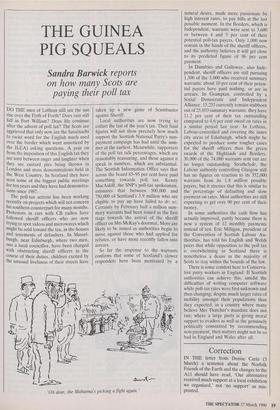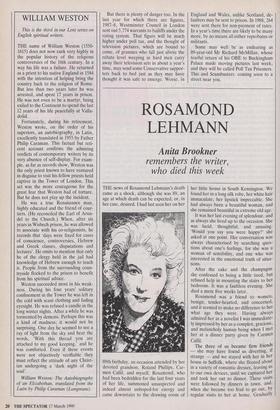THE GUINEA PIG SQUEALS
Sandra Barwick reports
on how many Scots are paying their poll tax
DO THE men of Lothian still see the sun rise over the Firth of Forth? Does rain still fall in Fort William? Does life continue after the advent of poll tax? The Scots are aggrieved that only now are the Sassenachs (a racist word for the English much used over the border which went unnoticed by the ILEA) asking questions. A year on from the imposition of this English tax they are torn between anger and laughter when they see custard pies being thrown in London and mass demonstrations held in the West Country. In Scotland they have seen some of the biggest public meetings for ten years and they have had demonstra- tions since 1987.
The poll-tax activist has been working recently on projects which will not concern his southern counterpart for many months. Protestors in cars with CB radios have followed sheriff officers who are now trying to spot videos and microwaves which might be sold toward the tax, in the houses and tenements of defaulters. In Mussel- burgh, near Edinburgh, where two men, one a local councillor, have been charged With obstructing sheriff officers in the course of their duties, children excited by the unusual liveliness of their streets have taken up a new game of Scumbuster against Sheriff. Local authorities are now trying to collect the last of the year's tax. Their final figures will not show precisely how much support the Scottish National Party's non- payment campaign has had until the sum- mer at the earliest. Meanwhile, supporters of the poll tax talk percentages, which are reasonably reassuring, and those against it speak in numbers, which are substantial. The Scottish Information Office says that across the board 85-95 per cent have paid something towards poll tax. Kenny MacAskill, the SNP's poll-tax spokesman, estimates that between 500,000 and 750,000 of Scotland's 3.9 million who are eligible to pay up have failed to do so. Certainly by February half a million sum- mary warrants had been issued as the first stage towards the arrival of the sheriff officer on Mrs McKay's doormat. More are likely to be issued as authorities begin to move against those who had applied for rebates, or have more recently fallen into arrears.
So far the response to the warrants confirms that some of Scotland's slower responders have been motivated by a `Oh dear, the Mahatma's picking a fight again.' natural desire, made more passionate by high interest rates, to pay bills at the last possible moment. In the Borders, which is Independent, warrants were sent to 3,600 or between 4 and 5 per cent of their potential poll-tax payers. Only 1,000 now remain in the hands of the sheriff officers, and the authority believes it will get close to its predicted figure of 96 per cent payment.
In Dumfries and Galloway, also Inde- pendent, sheriff officers are still pursuing 1,500 of the 3,000 who received summary warrants: about 10 per cent of their poten- tial payers have paid nothing, or are in arrears. In Grampian, controlled by a Social Democratic and Independent Alliance, 13,253 currently remain stubborn out of 25,033 summary warrants: they have 11.2 per cent of their tax outstanding compared to 4.6 per cent owed on rates in a similar period last year. In Lothian, Labour-controlled and covering the inner city areas of Edinburgh, which might be expected to produce some tougher cases for the sheriff officers than the green swards of the Highlands and Borders, 30,000 of the 74,000 warrants sent out are no longer outstanding. Strathclyde, the Labour authority controlling Glasgow still has no figures on reaction to its 352,000 warrants from its 1.8 million possible payers, but it stresses that this is similar to the percentage of defaulting and slow payment on rates. Most authorities are still expecting to get over 90 per cent of their money.
In some authorities the cash flow has actually improved, partly because there is now a system of 12 monthly payments instead of ten. Eric Milligan, president of the Convention of Scottish Labour Au- thorities, has told his English and Welsh peers that while opposition to the poll tax is overwhelming in Scotland there is nonetheless a desire in the majority of Scots to stay within the bounds of the law.
There is some comfort here to Conserva- tive party workers in England. If Scottish authorities can achieve this, amidst the difficulties of writing computer software while poll-tax rates were first unknown and then changing; despite much larger rates of mobility amongst their populations than they expected; in a country where many believe Mrs Thatcher's mandate does not run; where a large party is giving moral support to evaders as well as the genuinely politically committed by recommending non-payment, then matters might not be so bad in England and Wales after all. But there is plenty of danger too. In the last year for which there are figures, 1987-8, Westminster Council in London sent out 5,774 warrants to bailiffs under the rating system. That figure will be much higher under poll tax, and the thought of television pictures, which are bound to come, of grannies who fall just above the rebate level weeping as hard men carry away their television sets in about a year's time, may send some Conservative suppor- ters back to bed just as they may have thought it was safe to emerge. Worse, in England and Wales, unlike Scotland, de- faulters may be sent to prison. In 1988, 264 were sent there for non-payment of rates. In a year's time there are likely to be many more, by no means all either reprobates or militants.
Some may well be as endearing as 89-year-old Mr Richard McMillan, whose tearful return of his OBE to Buckingham Palace made moving pictures last week, and they will be called Poll Tax Prisoners. This and Scumbusters: coming soon to a street near you.



























































 Previous page
Previous page